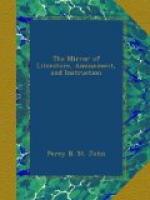His father, the joiner, however, thought that to draw on paper was nothing, and wood was the only material on which it was worth one’s pains to work. Accordingly, whenever the boy asked paper for drawing, he threw him a bit of wood; so that Gottfried was fain to try also cutting animals in wood, an art in which he speedily attained such dexterity, that, by degrees, his wooden sheep and goats came to ornament all the presses and mantel-pieces in the village. Occasionally, too, he tried drawing likenesses of some peasant boys of Worblaufen, or carving them in wood; and these attempts were not unsuccessful.
It is unknown on whose recommendation Mind, in his eighth year, was placed at the academy for poor children, which Pestalozzi had previously instituted at Neuenhof, near Bern, Aargau; but, in the year 1778, we find, in the authentic account of that institution, published by the Economic Society of Bern, the following short and somewhat clumsily expressed notice:—“Friedly Mynth of Bossi (Mind of Pizy), of the bailliwick of Aubonne, resident in Worblaufen, very weak, incapable of hard work, full of talent for drawing, a strange creature, full of artist-caprices, along with a certain roguishness: drawing is his whole employment: a year and a half here: ten years old.” Neither do we know how long he remained at this academy; somewhere between the years 1780 and 1785, he came to the painter, Sigmund Hendenberger, at Bern, a man who had formed himself mostly at Paris in the Boucher school, but afterwards rather inclined to Greuze’s style, and who, by his painting of Swiss family pieces, had acquired a considerable sum of money, and a reputation not undeserved. With this person Mind learnt his art of drawing, and colouring with water-colours, &c. but nothing more; in all the other branches of human knowledge he remained at the lowest grade; for he could with difficulty be made to write his name, and he had not the slightest idea of arithmetic. Thus, for example:—once, when he had to pay the postman six kreuzers for a letter, and Madame Freudenberger gave him the money in two silver pieces, he positively refused to take them and carry them down, affirming that two pieces were not enough; and, though his mistress assured him that these were equal in value to six kreuzers, still he persisted in his refusal, and went on grumbling until the six kreuzers, one by one, were counted into his hand. This ignorance and helplessness his master was not slow to take advantage of, so that poor Mind never once thought of looking about him for a better place. From his entrance into Freudenberger’s house up to the time of his death, there is nothing to tell of him except that he spent his whole life on the selfsame stool, busied in colouring Freudenberger’s sheets so long as he was alive, and, after his death, in drawing and painting, after his own fancy, bears, cats, and children at play, for the benefit of the widow, with the same pitiful day’s wages which




